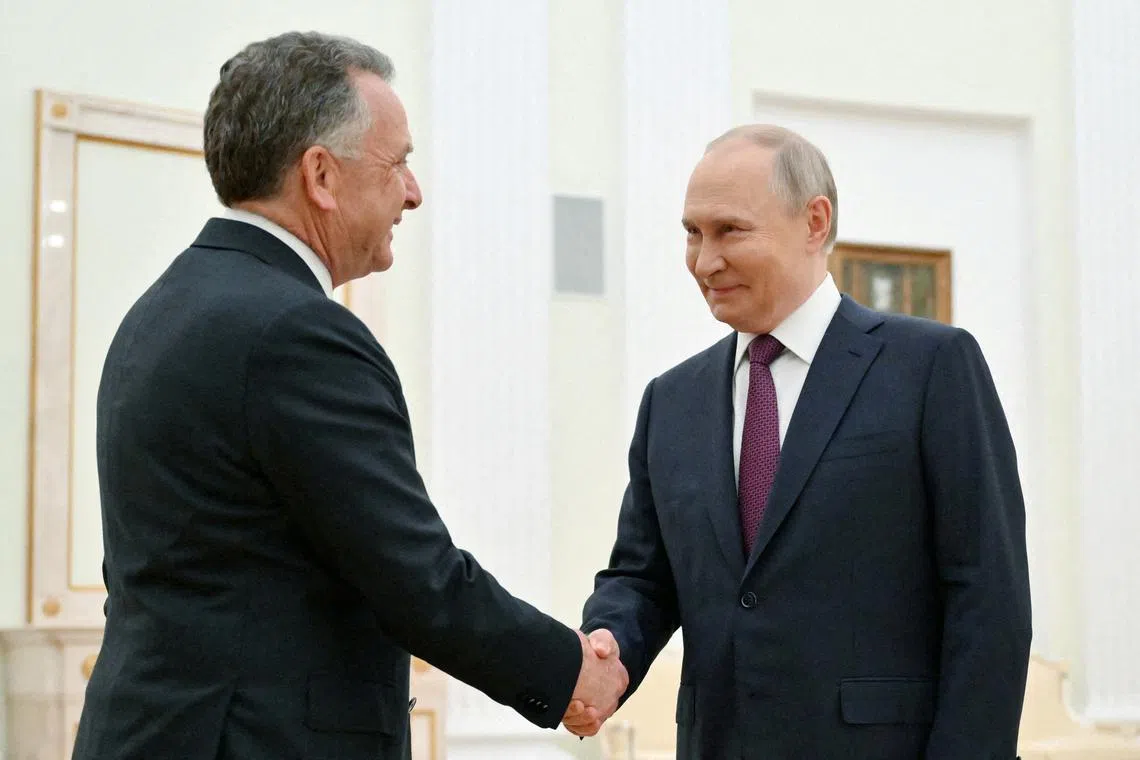Trump’s envoy Witkoff lands in Moscow on last-minute trip before sanctions deadline
Sign up now: Get ST's newsletters delivered to your inbox

Mr Witkoff, a real-estate billionaire, has had several long meetings with Mr Putin.
PHOTO: REUTERS
MOSCOW - US envoy Steve Witkoff arrived in Moscow on Aug 6 on a last-minute mission to seek a breakthrough in the Ukraine war, two days before the expiry of a deadline set by US President Donald Trump for Russia to agree to peace or face new sanctions.
Mr Witkoff was greeted by Mr Kirill Dmitriev, Russia’s investment envoy and head of its sovereign wealth fund. State media showed the two men strolling together through a park near the Kremlin, deep in conversation.
A source familiar with Mr Witkoff’s schedule told Reuters in Washington on Aug 5 that Mr Witkoff would meet the Russian leadership on Aug 6. The Kremlin has said he may meet President Vladimir Putin, but has not confirmed that.
Mr Trump, increasingly frustrated with Mr Putin over the lack of progress towards a peace deal in Ukraine
He is exerting particular pressure on India
Mr Putin is unlikely to bow to Mr Trump’s sanctions ultimatum because he believes he is winning the war and his military goals take precedence over his desire to improve relations with the US, three sources close to the Kremlin told Reuters.
“The visit of Witkoff is a last-ditch effort to find a face-saving solution for both sides. I don’t think, however, that there will be anything of a compromise between the two,” said Professor Gerhard Mangott, an Austrian analyst and member of a group of Western academics and journalists who have regularly met Mr Putin over the years.
“Russia will insist it is prepared to have a ceasefire, but (only) under the conditions that it has formulated for the last two or three years already,” he said in a telephone interview.
“Trump will be under pressure to do what he has announced – to raise tariffs for all the countries buying oil and gas, and probably uranium as well, from Russia.”
The Russian sources said Mr Putin is sceptical that yet more US sanctions will have much of an impact after successive waves of economic penalties during 3½ years of war.
The Russian leader does not want to anger Mr Trump, and he realises that he may be spurning a chance to improve relations with Washington and the West, but his war goals are more important to him, two of the sources said.
Mr Witkoff, a real estate billionaire, has had several long meetings with Mr Putin. He had no diplomatic experience before joining Mr Trump’s team in January, but has been simultaneously tasked with seeking ceasefires in the Ukraine and Gaza wars, as well as negotiating in the crisis over Iran’s nuclear programme.
Critics have portrayed him as out of his depth when pitched into a head-to-head negotiation with Mr Putin, Russia’s paramount leader for the past 25 years.
On his last visit in April, Mr Witkoff – unaccompanied by diplomats or aides – cut a lonely figure when seated across the table from Mr Putin, Mr Dmitriev and Kremlin foreign policy aide Yuri Ushakov.
Critics have at times accused Mr Witkoff of echoing the Kremlin’s narrative. In an interview with journalist Tucker Carlson in March, for example, Mr Witkoff said there was no reason why Russia would want to absorb Ukraine or bite off more of its territory, and it was “preposterous” to think that Mr Putin would want to send his army marching across Europe.
Ukraine and many of its European allies say the opposite. Mr Putin denies any designs on Nato territory, and Moscow has repeatedly cast such charges as evidence of European hostility and “Russophobia”. REUTERS


